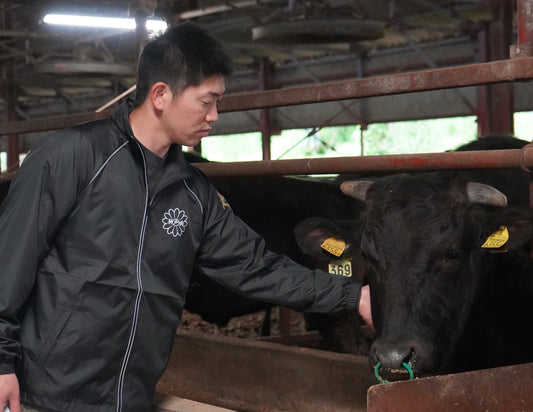
The Unique Characteristics of Wagyu
Share
Japanese Wagyu beef is celebrated worldwide for its exceptional flavor, tenderness, and intricate marbling. But what truly sets Wagyu apart is the care and dedication that goes into its production. From meticulous farming practices to unique flavor profiles, let’s explore the distinctive features of Wagyu beef.
1. Raised with Care: Like Part of the Family
Each Wagyu cow is raised with immense care, often treated as part of the family by its farmers. From birth to shipment, each cow is given individual attention and even named, reflecting the love and commitment of the producers. This personalized care forms the foundation of Wagyu’s incredible flavor and quality.
2. How Wagyu Cows are Raised
Wagyu calves spend the first 7 to 10 months of their lives on small family farms where they are nurtured with great attention. During this time:
- Calves are weaned from their mothers and bottle-fed milk by hand.
- Farmers use handmade calf jackets during colder months to ensure comfort.
After this early stage, the calves are sold at auction and moved to fattening farms. There, they are carefully fed until they reach around 700 kilograms (1,540 pounds), ensuring optimal growth and health.
3. A Special Diet for Superior Flavor
The diet of Wagyu cattle plays a crucial role in creating their unique flavor and texture. Their feed typically includes:
- Roughage such as grass and rice straw.
- Nutrient-dense concentrates.
- Whole Crop Silage (WCS), made from entire rice plants, which contributes to the high quality of marbling and the whiteness of the fat.
The inclusion of rice straw is particularly important for enhancing the fat’s color and texture, which are hallmarks of premium Wagyu beef.
4. Focus on Health and Well-being
To ensure healthy calves, Wagyu farmers often implement grazing practices for breeding and pregnant cows. This ensures that the cattle stay active and produce healthy offspring, contributing to the overall quality of the beef.
5. The Secret to Wagyu’s Flavor
Wagyu beef’s exceptional taste is derived from three main elements:
- Texture: A melt-in-your-mouth experience due to its fine marbling.
- Taste: A rich umami flavor that is unparalleled.
- Aroma: Known as “Wagyu beef aroma” or "Wagyu-kou," this unique scent combines fruity and coconut-like sweetness with savory depth.
Interestingly, the Wagyu aroma becomes most pronounced when heated to 80°C (176°F), which is the ideal cooking temperature for sukiyaki, one of Japan’s signature Wagyu dishes. This aroma persists even as the meat cools, allowing Wagyu to remain flavorful and enjoyable at any temperature.
6. Systematic Management for Quality Assurance
Japan employs advanced systems to ensure the quality and authenticity of Wagyu beef:
- Individual Identification: Each Wagyu cow is registered with a unique ID that records its birth date, sex, lineage, and farm history. This allows consumers to trace the beef back to its origins.
- Grading Standards: The Japan Meat Grading Association evaluates meat quality and yield based on consistent national standards. These grades ensure that only the best cuts are labeled as premium Wagyu.
- Pedigree Management: Rigorous efforts in registration and breeding research help maintain the quality and sustainability of Wagyu production.
Conclusion
The unique characteristics of Wagyu lie in the meticulous care given to every stage of its production—from its thoughtful upbringing and specialized diet to its unparalleled flavor and aroma. Combined with robust management systems, Wagyu offers an eating experience that is truly unmatched. It’s not just beef; it’s a testament to the dedication and craftsmanship of Japanese farmers.



